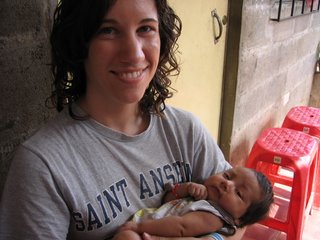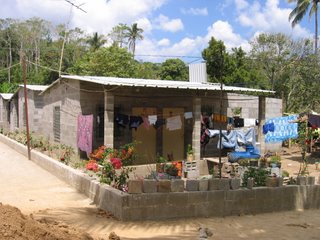taking the long view
So I've been thinking about starting a blog for awhile now, but it took time to convince myself that I have enough to share to make it worthwhile (I'm still not fully convinced, but I guess it's worth a shot). This, as it turns out, is how I do most things; I think about something long enough to get sick of it as a mental topic, and then I just pull the trigger (ew, bad gun reference, but it works) and do it. Or don't do it, as the case may be.
Anyway, my blog's title, perhaps unoriginally, is a reference to one of my favorite passages/prayers/quotes (whatever you want to call it) by Archbishop Oscar Arnulfo Romero, the liberationist church leader who lived - and died - for his impoverished brothers and sisters in then war-torn El Salvador. Romero's story has gripped me since I first learned of him in an undergraduate Liberation Theology course, but it became real to me when I spent a week with the poor in his native country last March. If you know me, you know that I question the inequities in our world and our first-world response to them pretty regularly. Well, during that week in El Salvador the reality of these inequities, the real human side of our vastly unequal world, slapped me in the face. It's not that I hadn't known of poverty or even been exposed to the American version of it at length before, but for me the unimaginable (and it is that way to most Americans) destitution of the developing world became all of a sudden real. I experienced their one room tin-walled, dirt-floor homes, their polluted and parasitic drinking/bathing/cooking/laundry water, their dusty and trash-strewn roads, their pregnant and barefoot women carrying four concrete blocks on their heads at once to help build a road for their community, their hungry children, their starving dogs, their sickly grandparents, their longing, their despair, their sense of abandonment, for the first time. But I also experienced their smiles, their children's enthusiasm for learning, their deep faith in a personal and real God, their generosity, their gratefulness, their willingness to pitch in for the good of their community, their gentleness of spirit, and, mostly, their love. These conflicting images will stay with me always and no words or photos will ever do them justice. I remind myself, as I do the college students I take on service trips to Latin America, that our short visits there, while well-intentioned, do not really improve life for the people we "serve." Instead, they open our eyes, they expand our horizons, they implant in us a deep and conflicting sense of harsh inequality and agapic love. We are now obliged, responsible, COMPELLED to be their advocates. Anything short of this would become our own contribution to their unrelenting poverty.
And so I question, I teach, I advocate, and now, I blog. I told my husband that I want to move to El Salvador and work for justice. I really do. I haven't, and I may not ever, but I will continue to try to do my part and call others to do theirs. I'm sure, given who I am, I will never feel that I do enough, and maybe this is why Romero's passage speaks to me so clearly.
There will be more to my blog than El Salvador and poverty; there is much more that I am passionate about, and much that I'm sure I'll feel compelled to share on a more mundane level. But this is where I'm at right now, it's a good introduction to me, at least the more serious and productive side of me, and we'll see where it leads. If you're still reading, thanks (!), and I will leave you with the full version of Romero's prophetic words, and perhaps a photo or two from El Salvador.
Prophets of a Future Not Our Own
by Archbishop Oscar Arnulfo Romero
It helps, now and then, to step back and take the long view.
The kingdom is not only beyond our efforts,
it is even beyond our vision.
We accomplish in our lifetime only a tiny fraction
of the magnificent enterprise that is God's work.
Nothing we do is complete, which is a way of saying
that the kingdom always lies beyond us.
No statement says all that could be said.
No prayer fully expresses our faith.
No confession brings perfection.
No pastoral visit brings wholeness.
No program accomplishes the Church's mission.
No set of goals and objectives includes everything.
This is what we are about.
We plant the seeds that one day will grow.
We water seeds already planted,
knowing that they hold future promise.
We lay foundations that will need further development.
We provide yeast that produces far beyond our capabilities.
We cannot do everything, and there is a sense of liberation
in realizing that. This enables us to do something,
and to do it very well. It may be incomplete,
but it is a beginning, a step along the way,
an opportunity for the Lord's grace to enter and do the rest.
We may never see the end results, but that is the difference
between the master builder and the worker.
We are workers, not master builders; ministers, not messiahs.
We are prophets of a future not our own.

Romero as he is depicted in the Catholic Church in Las Granadillas, El Salvador

This is Vanessa

Me with baby Joanna

This little girl is playing in the polluted, trash-strewn drinking and cooking water

This family is lucky; their home is made of concrete blocks

1 Comments:
Thanks for pulling me out of the very small car-insurance-buying, baby-won't-take-a-nap, rainy Monday world and reminding me that I do live for more than this! Sometimes, I need someone else to remind me of that.
Love what you said about the purpose of missions, of it opening our eyes rather than saving everyone else. Our church showed a video yesterday updating everyone on its "Books for Pastors" campaign, and I left feeling cynical.
On a lighter note, welcome to the world of blogging!
Post a Comment
<< Home